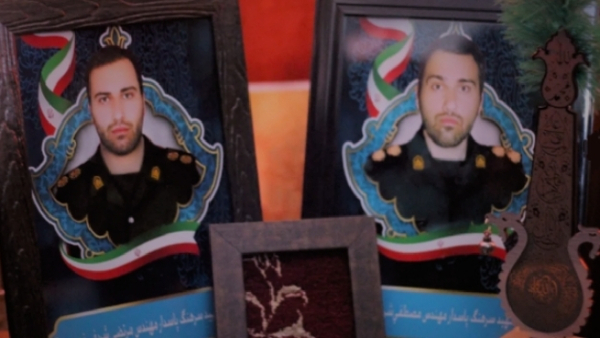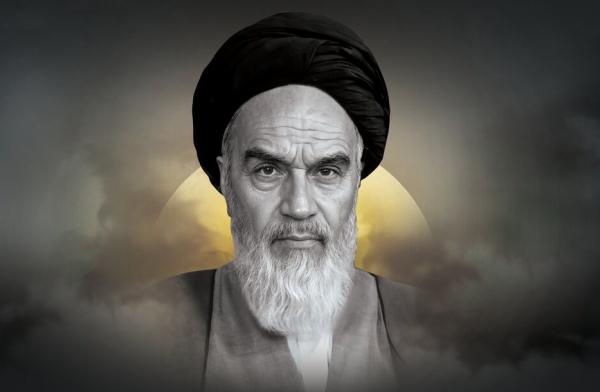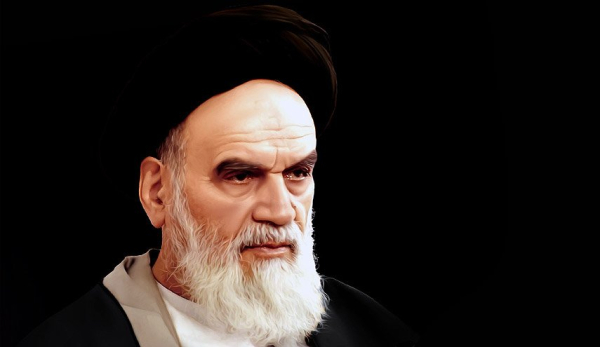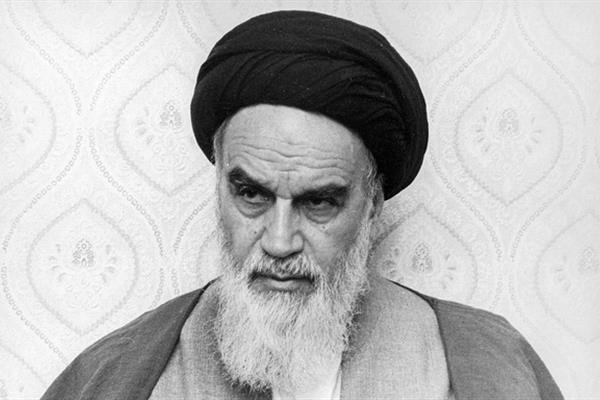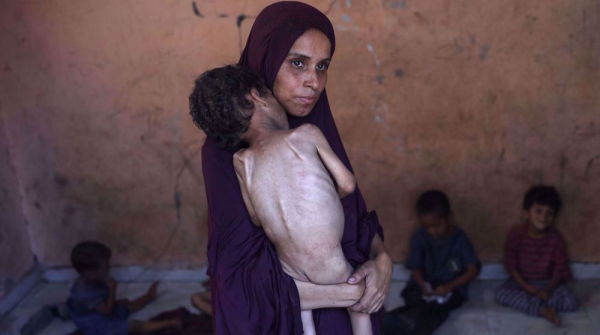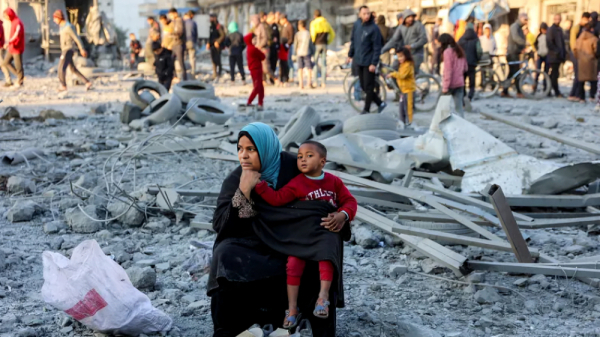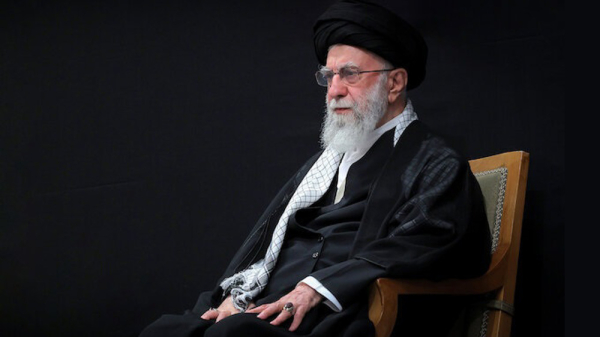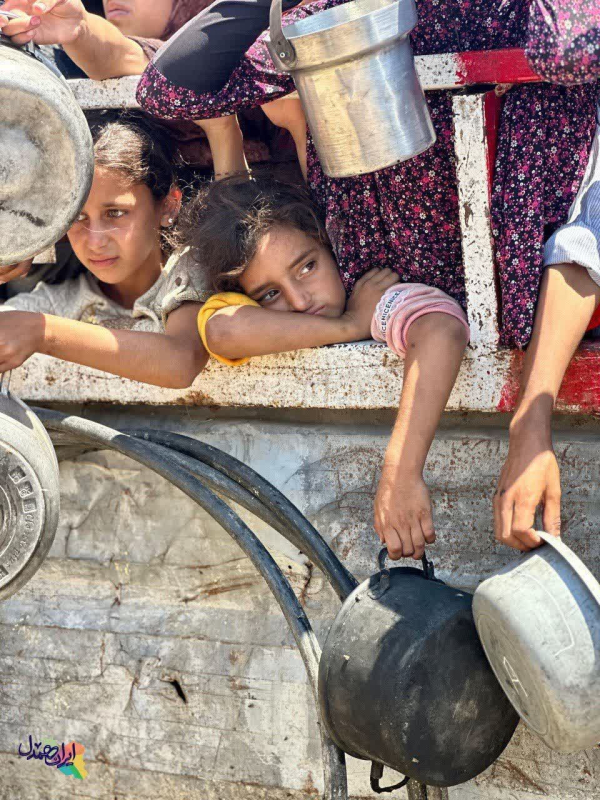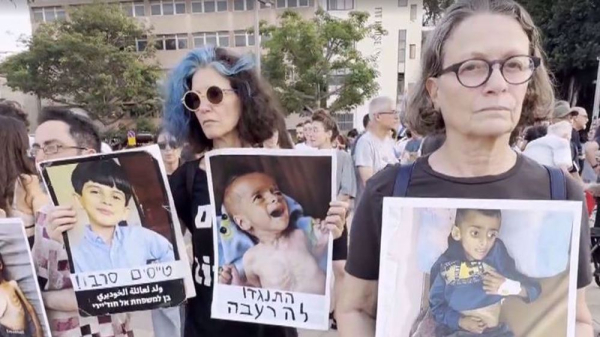zarezadeh
The Martyrdom of Hazrat Ruqayyah (PBUH)
She was a little girl.
In the book Iqad, page 179, it is stated:
"Hussain (PBUH) had a little daughter named Ruqayyah. She was with the prisoners of Damascus, and she cried day and night for her father's separation.
They told her: Your father has gone on a journey. One night, Ruqayyah saw her father in a dream, and when she woke up, she became very impatient and asked for her father.
No matter what the Ahlul Bayt (PBUH) did, she could not calm down. They also started crying because of her crying. They slapped her face and sprinkled dust on her head, and there was a lot of wailing and lamentation.
Yazid said: What happened?
They said: The daughter of Hussain (PBUH) saw her father in a dream and wants him.
Yazid said: Cut off her father's head and place it in front of her, so that she may be pleased.
Then they put the head in a tray, covered her face, and placed it in front of the girl.
She said: O man! I asked for my father, not food.
They said to her: Your father is here.
Ruqayyah pulled aside the cloak, picked up the head and pressed it to her chest, saying:
My dear father! Who dyed you with your blood?
My dear father! Who cut your veins?
Who made me an orphan in my childhood?
My dear father! Who owns women?
Who owns widows and captives?
Who owns foreign women?
My dear father! We have no one after you.
My dear father! I wish I could be your sacrifice.
I wish I had been blind before this.
I wish I had been buried and not seen that your hair was dyed with blood.
So she put her mouth on her father's face and wept until she lost consciousness.
When they shook her, they saw that her soul had left her body.
The women's wailing rose, and sorrow and mourning became new. Every Syrian who heard their voice wept. Men and women wept that day. Then, by the order of Yazid, they bathed him and buried him."
Peace be upon Ruqiyyah
The Zionist regime had offered a reward for the assassination of these elite twins.
After the 12-day war, it was rare to hear a story behind the scenes of the firing of missiles and drones by the homeland that landed in the heart of Tel Aviv. Of untold bravery; of stories that can be written in Shahnamehs and fill the history of Iran, of the stories of true heroes.
The story of the twin engineers of Kermanshahi; The martyrdom of IRGC Lieutenant Colonels Morteza and Mustafa Sharifinasb and the moments of their martyrdom are just two of the dozens of stories from the land of Iran that we listen to with bated breath.
It is by hearing these stories that we become convinced that if it were not for the courage and audacity of the soldiers behind General Hajizadeh in launching missiles and drones for the homeland, perhaps the 12-Day War would have turned out differently.
When the missiles flew at the same time as the twins were martyred
If Morteza Khari had stepped on his foot, Mustafa would have felt his pain. If Mustafa was well, Morteza would have smiled wherever he was. The twins also had telepathy in their martyrdom.
From Tehran, with the Kermanshahi accent of Reza Sharifinasb, the brother of the martyrs, we go to the city of Kurdish lion cubs and begin our story of the twin aerospace engineers of the Kermanshah IRGC from the last moments of their lives;
"After Iran decided to respond to the Israeli attack in the shortest possible time, Morteza, Mustafa, and 10 of the Kermanshah IRGC Aerospace Force knew that in order to carry out the operation in a situation where the Iranian sky was unsafe and reconnaissance drones could target them at any moment and prevent the launch of missiles and drones, the cost of launching missiles and drones through launchers might cost them their lives.
But our Iran is full of those who understood Hussein. I knew that passion and zeal that I had from my brothers, knowing that they could be martyred at any moment, while preparing the launchers for firing, they had also recited their martyrdom and muttered, "Sacrifice for the head of my leader!" These moments were narrated by their wounded comrades. In the end, the flight of the missiles became one with their own flight, and out of those 11, 5 of them became heavenly."
Israel was afraid of the aerospace kids and the students of General Hajizadeh, and still is afraid of the Iranian soldiers who have been fed milk. He knew very well what kind of zealous soldiers he was dealing with.
"Faezeh Salimi", the wife of Morteza Sharifinasb, recalls a memory from some time ago and says: "One night, Mr. Morteza was telling us with a laugh and saying that they had distributed the photo of me, Mustafa, and a few other children to groups affiliated with Israel and that they had written that they had put up a million-dollar reward for killing these Iranian aerospace forces. They don't know that we have no qualms about martyrdom, that we will go to meet him.
I asked. I got worried. But Mr. Morteza said that life is in the hands of God. Don't worry, madam! We will be the masters of our lives until the last moment of our lives. It was really like that, Mr. Morteza and Mr. Mustafa fought until the last moment of their lives. Even though a garrison had set up a few meters away from them, they did not leave the field and stayed until their last breath. On the day of Eid al-Ghadir, Morteza was martyred like Mullah Ali (AS). The shrapnel pierced his head. But Mustafa was taken to the hospital. Mustafa was born two hours later than Morteza. He was martyred two hours later than him. It was as if God had arranged the lives of these two twin brothers to be equal, even in hours and seconds.”
Birth in the bombing of Kermanshah
How did the Kermanshah twin brothers become a thorn in Israel’s side? We tell the story of Morteza and Mustafa from the last scene. The words of the brother and wife of Morteza Sharifinasab, who are related to the setting of the hours and seconds of their lives, flash back to 35 years ago, to the Iran-Iraq war and the heavy shadow of the bombings of Kermanshah, and we resume the narrative from the words of the martyrs' brother and from the delivery room of one of the cities of Kermanshah;
"In those years, there was no ultrasound and prenatal gender determination, or if there was, there was no such equipment in the peripheral areas of Kermanshah. We did not know that my mother was pregnant with twins. We went to the hospital when she started having pain. Morteza was born and the mother's pain had not yet ended and her belly was still protruding when God announced the second blessing, and the midwife's voice in the delivery room was distorted when she said there was another one. The children are twins. Two hours after Morteza, Mustafa was born. Two twin brothers with white faces like the crescent moon who did not mix with each other.
In 1965, I was 15 years old when the twins were born. Dad was always at work and away from the city. I was the eldest son of the family and in a way I was the father of the children. Most of their responsibilities were with me. School registration and following up on all the twins' work. It was the post-war era and the economic problems after the war. In short, we looked at each other and the children went to school. They got their diplomas with high GPA. They were studious and top of the class in math. It so happened that both of them were accepted to study mechanical engineering and solid design at Ahvaz University and at this point in their lives they were also outstanding and graduated from the university with an A grade.”
Production line engineering in a factory or joining the soldiers of Sardar Hajizadeh!
There was a lot of work for the mechanical engineer twins. But the bachelor's degree had not yet dried when they made up their mind to be sent to military service. They had been serving for a few months when the path of their lives changed; They decided to use their intelligence and knowledge in the service of their homeland, and the story of the beginning of the ups and downs of the journey, full of goodness and blessings, can be heard from the brother's lips;
"They had been serving for a few months when, considering the twins' high intelligence, education, and their status as guardians, they offered them the opportunity to join the IRGC Aerospace Force and continue their studies at Imam Hussein University. At that time, I told them, in accordance with the duty I was in charge of and being their older brother, "Have you thought about it? Your path is not an easy one. It is difficult. Your responsibility will be multiplied many times over. I even invited them to go to a factory whose boss had requested that the twins become production line engineers with high salaries and benefits. I took the children to the factory. But they didn't want to. They had chosen their path. Both of them together. In fact, every decision they made was a decision for the two of them. They had agreed to build their lives together and move forward. Both majored in mathematics and physics, and then in a different major, in a different university. They consulted as a couple to join the IRGC Aerospace Force and made their decision."
Kermanshah UAV Elites
The beginning of a path full of ups and downs for construction, for the pride of Iran. The identical twins from Kermanshah soon became one of the elites of the Kermanshah IRGC aerospace force. Their older brother remembers those days very well; “Participating in different courses and gaining experience meant that we saw the twins less often. They were so absorbed in their service that they were not at home much. They worked with all their heart. They didn’t talk to us much about their work. They didn’t give us any information, but we more or less understood that Morteza and Mostafa had used their intelligence and knowledge to serve the development of the aerospace industry and the advancement of Iran’s UAVs.”
The Leader’s words should not be left unspoken
“Morteza and Mostafa worked day and night. They never complained about the difficulty of the work. Some days when they came home, I would see their hands cut and bruised. The aerospace kids work like Basijis and in teams. They also did heavy manual work. It wasn’t like they said, for example, because I have such and such a degree or am an engineer, I shouldn’t move equipment. Whenever I would say to one of them, doesn’t this amount of work tire you out? Don’t you give yourself a break? They would say, “The words of the Holy Prophet should not remain unfulfilled.” We must become strong. We must progress every day.
We still don’t know what kind of strength God gave these kids that fatigue meant nothing to them. After the martyrdom, when we got to know their colleagues better, we saw that all of these kids were the same. Sincere, sincere, hardworking, provincial.
It is this Basij spirit and commitment of the IRGC aerospace guys that, under the strong management of General Martyr Hajizadeh, has made Iran one of the powerful countries in the field of developing the drone industry, so much so that many countries that have something to say in the field of military equipment are requesting Iranian drones. The undemanding and hardworking aerospace guys are building advanced drones at the lowest cost and upgrading previous drones.”
I stayed 8 hours overtime, but I turned down 3 hours
The stories of the martyr’s brother that come to the undemanding and hardworking of aerospace workers remind me of the words of the martyr’s wife; when she said that Mr. Morteza worked too much. Sometimes he worked 8 hours overtime, but when he came home and felt tired, he would say, “I stayed 8 hours today, but I turned down 3 hours of overtime.” I asked why? He said, "I didn't work for those 8 hours. I prayed. I talked to you. This way, I feel more at ease."
A stone in the fight against ISIS
It had not been a few years since the twin brothers joined the aerospace force when ISIS attacked the Two Holy Mosques. The engineers did their best in the fight against ISIS and in defending the shrine. The older brother says of those days; "Morteza and Mustafa went to Iraq and Syria of their own free will to help defeat ISIS alongside the Quds Force forces and in a situation where ISIS had taken control of the region. Each of them was in Iraq for more than 500 days and, together with General Soleimani, they spared no effort to reduce the evil of ISIS in the region."
Mother's reaction after hearing about the simultaneous martyrdom of twins
It's hard to stand behind glass and watch the doctors' futile efforts to bring your brother back to life, the Sharifi-Nasab family lost two loved ones on the first day of the war in the defense of the homeland; twin children two hours apart; two young Rana.
They were left in the hospital that day, wondering how to tell their mother about Mustafa's martyrdom. She had just learned that Morteza was no more. Now how to tell her that meeting Mustafa had gone to the afterlife! But it seems that when God passes martyrdom on to his family, patience in the face of pain is also wrapped up in a gift and presented to his loved ones. Like the father and the snake of the twins.
When we hear the reaction of the mother of the Sharifi-Nasab martyrs upon hearing the news of the martyrdom of her children, we are reminded of this unwritten rule; "My mother would have gone crazy if she had followed Murtaza and Mustafa. She loved them so much that she was madly in love with them. But that day in the hospital, when she heard the news of Murtaza and Mustafa's martyrdom, she cried and said, "For the sake of Imam Hussein's (AS) head, O God, make them guests at the table of the Ahlul Bayt today!" We were just looking at them during the Hajj and Waj. My parents comforted me and the sisters and wives of the martyrs. Murtaza has a 5-year-old daughter and Mustafa has two children, a few months old and a 5-year-old.
Obstacles to Islamic Awakening from the Perspective of Imam Khomeini (RA)
1- Turning to Western Culture
Imam Khomeini, as the founder of the Islamic Republic of Iran, was not like the intellectuals and leaders of other Islamic movements who emphasized the need for complete submission to the West, nor like the thinkers who rejected any use of Western tools and techniques. Rather, the Imam's view of the West and its culture can be divided into two areas: cultural and technical. In the technical and instrumental areas, he emphasized the need to use human experiences, but in the area related to human and social identity and intellectual and cultural foundations, he considered any imitation of the West and self-destruction to be the main cause of the misery of Eastern and Islamic societies.
2- Division
From the perspective of Imam Khomeini (RA), creating division is a policy of colonialism that must be fought against. Stirring up religious and sectarian differences is only in the direction of the policy of the enemies of Islam. It is in the shadow of maintaining unity that the enemies of Islam can be suppressed and Muslims can be restored to their lost dignity. In this case, the hand of the superpowers will be cut off from the Islamic countries and the establishment of the Islamic government will be achieved: "Islam came to unite all the nations of the world, Arabs, non-Arabs, Turks, Persians, all together and establish a great nation in the world called the nation of Islam, so that those who want to gain dominance over these Islamic states or Islamic centers, will not be able to do so through the great community of Muslims from every tribe. The plan of the great powers and their affiliates in the Islamic countries is: to separate these Muslim groups, among whom God Almighty has created brotherhood and has called the believers in the name of brotherhood, and to separate them from each other, but rather to make them enemies of each other under the name of: the Turkish nation, the Kurdish nation, the Arab nation, the Persian nation. And this is exactly contrary to the path of Islam and the path of the Holy Quran. All Muslims are brothers and equals and none of them is separate from each other. All of them should be under the banner of Islam and under the banner of monotheism. Those who, in the name of nationality, sectarianism, and nationalism, divide Muslims are the armies of Satan and helpers of the great powers and opponents of the Holy Quran.
The unclean hands that are trying to create discord between Shiites and Sunnis have sought to limit the impact of the Islamic Revolution and prevent its effects from spreading in Sunni areas (both its oil-rich areas and the countries fighting Israel).
3- Distortion of Islam and religious concepts
As Islamic societies gradually moved away from the original Islamic concepts and teachings and the initial message of justice-seeking Islam changed, this school slowly deviated and became stagnant. Valuable concepts such as justice, equity, jihad, martyrdom, the good cause, etc., were either corrupted or forgotten because they were dangerous to those in power. Instead, issues such as fate and predestination, the creation or antiquity of the Quran have been the most important issues of religious and Islamic thought for many years. Through such issues, people's religious concerns have been controlled and have become the focus of intellectuals' attention. On the other hand, sectarian and Arab tendencies, the introduction of Greek thoughts and ideas and non-Islamic culture, and inspiration from Western education and worldviews have isolated Islamic ideals. Later, these issues led to the perception that Islam is not compatible with the contemporary era. Most of the educated, unaware of the rich treasures and accumulations of their Islamic culture, saw the key to development and even salvation of society in adopting Western sciences, values, and philosophy. In a meeting with some officials, the Imam points out that the enemies have seen their way to salvation in either the absence of Islam in these countries or at least its lack of content. Although they have not succeeded in the first part, they have succeeded in emptying Islam of its content. (Sahifa Noor, Vol. 20, p. 118). “Islam is the religion of the mujahideen who are in pursuit of truth and justice, the religion of those who want freedom and independence, the school of fighters and people against colonialism. But they have introduced Islam in a different way... In order to take away the revolutionary and vital nature of Islam and prevent Muslims from striving and moving and mobilizing... They have propagated that Islam is not a comprehensive religion, it is not a religion of life, it does not have systems and laws for society. It has not brought a way of government and laws of government. Islam is only the rules... It also has ethics, but it has nothing about the life and administration of society.”
4- Leaders of Islamic countries
“One of the obstacles in the way of the awakening movement is the rulers and leaders of Islamic countries. They consider the establishment of pure Islam to be contrary to their personal and governmental interests, the problem of Muslims is the governments of Muslims. It is these governments that have brought Muslims to this day...”.
"The black and shameful record of the ruthless rulers of Islamic countries is evidence of adding pain and misery to the half-hearted body of Islam and Muslims."
5 - The petrification and stagnation of the holy icons
The Imam mentions the holy icons as one of the obstacles to Islamic knowledge and awakening, and considers it necessary to recognize and fight against them for the spread of Islam: "...America and arrogance have people up their sleeves in all fields. In the seminaries and universities, the holy icons, whose danger I have warned about time and again, are destroying the content of the revolution and Islam from within with their deceit. They introduce everyone as irreligious with the appearance of being right and supporting religion and guardianship. We must seek refuge in God from their evil... Today, the world is thirsty for pure Muhammadan Islam."
"Today, Muslim society has become such that fake saints prevent the influence of Islam and Muslims and attack Islam in the name of Islam... They spread their spirit and thoughts in society in the name of Islam...."
6 - Intellectuals
Just as petrification and rigidity from the perspective of
Strategies for expanding Islamic awakening from the perspective of Imam Khomeini (RA)
1- Relying on nations instead of states
Since Imam Khomeini considered the line of nations to be separate from states, he believed that the basis should be the people and the thoughts of the people, and the people should be the focus, not the states...
2- Holding scientific congresses among scholars and thinkers of the world
Inviting scholars and freethinkers from different countries is another way of introducing the Islamic Revolution to the world and neutralizing the enemy's propaganda, and as a result, awakening the nations through them. If diversity is observed in inviting individuals and the criteria for inviting are not only stereotypical and congressional personalities, and if the ground for the presence of enlightened-thinking youth, students, and educators from different countries is provided, perhaps our success will be greater.
3- Mutual relations between countries
In this regard, we can both send our believing and revolutionary forces to different countries and communicate with the people of those countries, and we can also use the presence of foreigners in the cities of our country, so that in addition to familiarizing them with ancient and historical artifacts, we can also introduce the revolution and our school. The Holy Prophet of Islam (PBUH) used to travel to Mecca for trade, invite people to Islam and explain the fundamentals of religion to them, and some of them would convert to Islam and after returning to their cities and lands, they would be missionaries for Islam and the Prophet.
4- Explanation of Pure Islam by Seminaries
The Imam says: Seminaries and Islamic scholars are the main ones responsible for introducing the Islamic Revolution to the world. If the pure Islam of Muhammad (PBUH) had been clarified from American Islam and the Islam of the petrified saints, godless capitalists and the painless wealthy, and if the seminaries had explained to the people this important political obligation that it is not possible for two opposing and opposing ideologies to exist in one school, perhaps all this damage would not have been inflicted on us.
5. The impact of the Iranian Ministry of Foreign Affairs
One of the important issues that you, like us, are obliged to do is to act in such a way that your own actions there, your behavior with the employees, the actual state of the embassy and the embassy's status are such that your revolution is gradually exported to the country you are in... Exporting Islam means that Islamic ethics, Islamic manners, Islamic practices are such that people pay attention to them.
6- The Great Hajj Congress
With proper behavior and Islamic and revolutionary ethics, they will attract everyone's attention and present the face of the Islamic Revolution as it is to the nations and attract their attention to the great Iranian Revolution with brotherly and loving attitudes and practically neutralize corrupt, biased propaganda and propaganda horns.
7- Forming the Basij of the Oppressed in the World
The Basijis of the Islamic world should be thinking about creating a great Islamic government, and this is possible because the Basij is not limited to Islamic Iran alone. It should create resistance nuclei throughout the world and stand against the East and the West. The Islamic Revolution in the world needs your sacrifices.
8- Sending athletes
You young people who go to different countries and large crowds come to watch you, to watch your powers, you should do so that you invite these large crowds to Islam in practice. In your actions, in your behavior, in your conduct, be such that you will be an example for the Islamic Republic to go to other places with you, God willing.
Requirements for the realization of Islamic awakening from the perspective of Imam Khomeini (RA)
Awareness and unity of the nation
The necessity of the awakening of the nations was among the issues that the Imam (RA) considered a necessary condition for starting the struggle and believes: "It must be shared with the nations; just as in Iran, it was the Iranian nation that was the cause of the disaster that was happening to Islam at the hands of America and its henchmen, the infamous Pahlavi regime, it was these Iranian youth and this Iranian nation... and it was these young people of the Basij and the Iranian tribes who understood their duty together, woke up and clenched their fists together and drove the tanks out of the scene with their fists. In order for the nations not to find such an awakening and in order for the nations not to find unity as one, they must know that they are condemned to corrupt governments and condemned to the criminal America and other superpowers. Despite having all those reserves, all those possibilities."
Relying on Islam in the struggle against evil powers
As the problems of Muslims increased, most Islamic intellectuals came to the conclusion that the only way to deal with the problems (including tyranny, colonialism, etc.) was to return to the original and pure Islam. And the root of misfortunes is the distance from the original Islam. And this is the point that the Imam (may Allah have mercy on him) emphasized, the awakening of the oppressed nations and oppressed Muslims depends on their raising Islamism, and they had full faith in the victory of Islam: "I say with confidence that Islam will bring the superpower to the ground of humiliation. Islam will remove the great obstacles inside and outside its borders one after another and will conquer the key strongholds of the world" (ibid., vol. 20, p. 118 (.
The Imam's proposal of this ideal is not dependent on having power, an issue that caused some people to doubt and doubt: Some people think that since we do not have the power to establish Islam and justice in the world, then we do not have a duty, unaware that the divine prophets have also proposed ideals that were not possible to realize in their era and time, but they answer this doubt with a clear statement.
Call to faith and Islamic unity
Islamic unity is the only way to fight against the arrogant, and the main factor in the liberation of nations. Imam Khomeini, may God have mercy on him, says in this regard: "By the will of God Almighty, although we were helpless and our nation had no weapons or military equipment in its hands, we overcame the forces of the tyrants through the power of faith and the unity of the word. And I hope that all Islamic nations will rise up and, with the unity of the word and with the consideration of Islam and the power of faith, overcome the foreigners and those who want to have these nations under their control and domination forever. The secret of the victory of Muslims in the early days of Islam was the unity of the word and the power of faith. We must fight the forces of disbelief with the power of Islam and remove the hands of criminals from our countries. If unity was the word of Islam and if the states and nations of Islam were united, it would not make sense that the nearly one billion Muslim population would be under the control of the powers. If this power, the great divine power, were combined with the power of faith and everyone walked together in brotherly love on the path of Islam, no power would overcome them.”
Enemy recognition and all-round uprising against enemies
The Imam (may Allah have mercy on him) believes that the main reason for the destruction and defeat of Islamic nations and states against arrogant states is the lack of all-round uprising of different groups, which will lead to the destruction of their honor and human values: “If today the different groups of nations, from religious scholars to speakers, writers and committed enlightened people, do not all-round uprising and do not reach the oppressed countries and nations by awakening the great masses of Islamic humanity, their countries will undoubtedly be destroyed and become more and more all-round dependent. And the Eastern atheistic plunderers and, worse than them, the Western atheistic plunderers will suck out the roots of their lives and destroy their honor and human values.”
Imam Khomeini (may Allah have mercy on him) considers enemy recognition a religious duty and always emphasizes it. One of his outstanding characteristics is his deep insight into the enemy and its tactics and his advice to the people to be vigilant against conspiracies: “The Islamic countries and the oppressed people of the world should find their Islamic power and not be afraid of the scoundrels of the East and the West and their affiliates and scum, and should rise up with trust in God Almighty and reliance on the power of Islam and faith and cut off the hands of criminals from their countries.”
Strengthening the spirit of faith and struggle against colonialist governments
Imam Rahmi says: Today, Islamic Iran, thanks to its strong faith and commitment to Islam and the great transformation that has been achieved in various strata, cuts off the hands of the East and the West and the deviant parasites from its country and does not allow any power to make the slightest interference in the Islamic country of Iran. And this is a decisive argument for Muslims and the oppressed of the world that no one can raise their hand to aggression and oppose it at the will of the nations, and a nation that has chosen the latter between humiliation and martyrdom is invincible.
Announcing comprehensive support for the Islamic awakening
Given that the dictionary of the Imam's (may Allah have mercy on him) movement is the fulfillment of duty in line with divine commands, therefore this idea is not limited to a specific time and place. Imam says: "We fully support all countries under domination to gain freedom and independence, and we explicitly tell them that the right is to be taken, rise up and overthrow the superpowers from the stage of history and times. I have said many times and I warn you now that if the oppressed East and Africa do not rely on themselves, they will be trapped forever.”
The inability of the powers to confront the awakened nations (the manifestation of the awakening in the nations)
Imam Rahmatullahi alaihi said: The cry that comes from the heart of a believer overcomes everything; it overcomes the White House and it overcomes the deaf.
Israeli forces kill 25 people in Gaza, including 13 aid seekers, since dawn
Israeli forces have killed dozens of Palestinians in their latest attacks across the Gaza Strip, including 13 aid seekers.
At least 25 Palestinians have been killed by Israeli forces across Gaza since dawn today, including 13 aid seekers, sources in Gaza hospitals told Al Jazeera.
According to UN reports, Israeli forces have shot dead more than 1,000 aid seekers at US-run Gaza Humanitarian Foundation (GHF) distribution points in the past months since May.
The UN human rights office reported on Tuesday that since May 27, more than 1,054 Palestinian civilians have been killed and thousands more have been wounded while approaching the US-run aid distribution sites in Gaza, being fired upon by the Israeli forces.
UN officials have described the deadly aid operation by the GHF under the strict control of the Israeli regime forces as “an abomination” and “a death trap.”
Traditionally in charge of aid operations in Palestine, the UN has also called for global action to end the brutal Israeli attacks and blockade on Gaza.
Philippe Lazzarini, the head of the United Nations Relief and Works Agency for Palestine Refugees (UNRWA), issued a warning last week calling for worldwide action to address Israel’s ongoing blockade of aid to the Gaza Strip.
Lazzarini said the international community’s inaction in this regard equates to complicity in the starvation of the people of Gaza.
Israel unleashed its brutal Gaza onslaught on October 7, 2023, after the Hamas resistance group carried out its historic operation against the occupying entity in retaliation for the regime’s intensified atrocities against the Palestinian people.
The Tel Aviv regime has so far failed to achieve its declared objectives of eliminating Hamas and freeing all captives in Gaza, despite killing nearly 60,000 Palestinians, mostly women and children, and injuring almost 144,000 others.
Press TV’s website
Hamas fires back at US over ceasefire blame, calls Netanyahu the real ‘obstructionist’
Palestinian resistance movement Hamas has blasted US officials for misrepresenting its negotiating position, identifying Israeli Prime Minister Benjamin Netanyahu’s cabinet as the primary obstacle to reaching a ceasefire.
“We are appalled by the statements of US President Trump and earlier by US special envoy Witkoff, which contradict the mediators’ assessment of Hamas’s position,” Izzat Al-Rishq, a member of Hamas’s political bureau, said in a statement released on Saturday.
On Friday, Trump blamed the Gaza-based resistance movement for the apparent collapse of the ceasefire talks, saying the group is going to be “hunted down.”
Witkoff also said on Thursday that Washington was cutting short its involvement in the negotiations, accusing Hamas of showing “a lack of desire to reach a ceasefire.”
Al-Rishq added that these statements are “inconsistent with the actual progress of negotiations that had been acknowledged by mediators, particularly Qatar and Egypt, as they expressed satisfaction and appreciation for our serious and constructive stance.”
The American statements, he noted, “deliberately ignore the real obstructionist to all agreements – Netanyahu’s [cabinet] – which continues to put obstacles, deceive, and evade commitments.”
“According to Al-Rishq, Hamas has negotiated flexibly and responsibly from the start of the negotiations, seeking a deal to end the war and Gaza’s suffering.
He dismissed US allegations of Hamas’s aid diversion as unfounded, citing a Reuters report that revealed flaws in Washington’s claims.
“The US State Department accused Hamas of stealing aid without providing visual evidence and that at least 44 of 156 aid theft incidents in Gaza had resulted from Israeli military measures.”
He called on the US to stop absolving the Israeli regime and “providing political/military cover for its genocide and starvation against over two million Gazans.”
The Hamas official also urged the US to apply real pressure on the regime “to seriously engage in ending the aggression and achieving a prisoner exchange deal.”
Despite ongoing indirect negotiations in Qatar, no agreement has been reached. While Tel Aviv has accused Hamas of delaying the process, the Palestinian group argues it is Israel that has obstructed progress by rejecting key conditions for a sustainable truce.
The proposed ceasefire also includes a prisoner exchange involving Israeli captives still held in Gaza. Of the 251 people taken on October 7, 2023, 49 remain in captivity, with the Israeli military believing that 27 of them are dead.
The occupying entity demands to dismantle Hamas’s military and governance infrastructure, while Hamas insists on guarantees for a lasting ceasefire, full Israeli withdrawal, and unimpeded flow of desperately-needed humanitarian aid.
The Israeli regime claims it has already accepted both the Qatari and the updated US proposals.
Press TV’s website
Leader: Iran’s military, scientific progress will accelerate
In a message marking the 40th day since the martyrdom of top Iranian commanders and scientists in a US-Israeli aggression, the Leader of the Islamic Revolution said both military and scientific advances will move forward with greater speed and determination.
In the Friday message to the Iranian nation, Ayatollah Seyyed Ali Khamenei condemned the “wicked and criminal Zionist ruling group” for aggression on Iran, calling it “a blow delivered by the vile and spiteful enemy of the Iranian nation.”
“Undoubtedly, the loss of commanders like Martyrs Bagheri, Salami, Rashid, Hajizadeh, Shadmani and other military personnel, as well as scientists such as Martyrs Tehranchi and Abbasi, is heavy for any nation,” the Leader said. “But the foolish and shortsighted enemy did not achieve its goal.”
Ayatollah Khamenei noted that the Israeli regime's attempt to slow down Iran’s progress has backfired.
“The future will show that both our military and scientific movements will accelerate even more rapidly toward high horizons, God willing,” he said.
The Leader’s remarks come in the wake of Israel’s June 13 aggression targeting senior Iranian officials and nuclear scientists in an act of terrorism that killed scores of civilians as well. Days later, the United States escalated the war by bombing three civilian nuclear facilities in Iran.
In a powerful response, Iranian Armed Forces launched retaliatory strikes on strategic Israeli targets across the occupied territories and also hit the al-Udeid air base in Qatar, the largest American military outpost in West Asia.
Iran’s coordinated operations forced a halt to the aggression by June 24.
Ayatollah Khamenei praised the Iranian people and institutions for their strength in the face of US-Israeli aggression. “This painful incident also revealed some shining points — the patience and fortitude of the survivors, not seen anywhere else except in the history of the Islamic Republic; the steadfastness of institutions under the martyred leaders, who ensured that this heavy blow did not hinder their progress; and the miraculous resilience of the Iranian nation, seen in its unity, spiritual strength, and firm determination to remain in the field.”
“These enemies are hammering cold iron,” he added. “The Islamic Republic will, by God’s grace, become stronger by the day.”
The Leader also laid out seven strategic duties for all sectors of Iranian society, including maintaining national unity, accelerating scientific and technological progress, preserving national dignity, enhancing defense capabilities, ensuring government efficiency, providing spiritual guidance, and fostering revolutionary enthusiasm — particularly among the youth.
“May the Merciful and Almighty God grant everyone success in fulfilling these duties,” he concluded.
Press TV’s website
Violation of the 1977 Protocol; The Zionist Regime and Responsibility for the Famine in Gaza
According to Mehr News Agency, Leyli Taghrobi, a legal expert, wrote in a note about the criminal actions of the Zionist regime against the residents of Gaza: Since the beginning of the Zionist regime’s all-out attack on the Gaza Strip in October 2023, the world has witnessed one of the most widespread and systematic contemporary humanitarian crises. The complete blockade, the destruction of basic infrastructure, the interruption of the flow of food and medicine, and the attack on water and energy supply centers have all been in line with a military strategy that aims to bring the civilian population to its knees through starvation.
This approach is a clear example of a violation of Article 54 of the First Additional Protocol of 1977 to the Four Geneva Conventions. In this article, citing sources of international humanitarian law and the practice of international institutions, the international responsibility of the Zionist regime for the deliberate famine in Gaza is examined.
Article 54 of Additional Protocol I: Prohibition of the Use of Famine as a Weapon of War Article 54 of Additional Protocol I to the Geneva Conventions states:
“The use of starvation as a method of warfare against civilians is prohibited. It is also prohibited to destroy, render useless, or damage objects indispensable to the survival of the civilian population, such as food, agricultural products, sources of drinking water and water supply installations.”
The purpose of this article is to protect the civilian population in international armed conflicts and to prevent the use of means that directly threaten the lives of civilians.
Examples of violations in the Gaza War
A review of developments on the ground in Gaza since October 2023 shows that the Zionist regime has systematically and deliberately taken the following measures to use famine as a weapon of war:
1. Complete blockade of the Gaza Strip
Since the first days of the offensive, the passage of food, water, fuel and medicine into Gaza through the border crossings, especially Rafah and Kerem Shalom, has been blocked.
2. Destruction of vital infrastructure
Bombing of agricultural fields, water supply systems, food warehouses and bakeries has caused many food and water supply centers to be out of service.
3. Blocking humanitarian aid
UN and non-profit aid convoys have repeatedly been targeted or blocked, with trucks carrying flour and water being destroyed or seized in some cases.
4. Creating artificial famine conditions
According to the World Food Programme (WFP), more than 90% of the population in Gaza is at a critical level of food insecurity and the risk of death from hunger, especially among children, is serious and real.
The International Responsibility of the Zionist Regime
In international law, the violation of peremptory norms, including humanitarian norms, gives rise to international responsibility for the offending state. Here, the Zionist regime, through its deliberate actions in starving civilians, bears international responsibility for the following reasons:
1. Violation of customary and treaty obligations
Although Additional Protocol I has not been ratified by Israel, parts of it, including Article 54, are recognized as customary international rules. Therefore, this article is binding even for states that are not parties to it.
2. International Criminal Responsibility
The use of famine as a weapon of war in international criminal law is an example of a war crime and, in some cases, a crime against humanity. Article 8 of the Rome Statute (International Criminal Court) lists the deliberate destruction of resources essential for survival as a war crime.
3. The need for reparation and accountability
According to the draft articles on State Responsibility in the International Law Commission (ILC), the responsible state must compensate for the damage caused and prevent its recurrence. In the event of continuation and intentionality of these actions, judicial avenues for international accountability are also provided.
The response of the international community
Despite the severity and scope of the crimes committed, the practical response of the international community to the famine in Gaza has remained mainly at the level of political condemnations and public statements. However:
UN special rapporteurs have repeatedly considered the actions of the Zionist regime to be an example of the use of hunger as a weapon.
The International Criminal Court (ICC) is examining cases of war crimes in the occupied Palestinian territories, which may also include famine.
The International Court of Justice (ICJ) has raised points about the possibility of genocide and the use of famine in the case of South Africa v. Israel.
Summary and Conclusion
The use of famine as a weapon of war is not only a clear example of cruelty in war, but also a clear violation of the fundamental rules of international humanitarian law. The actions of the Zionist regime in Gaza, including the complete blockade, the destruction of food supplies, and the denial of aid, are all gross violations of Article 54 of Additional Protocol I. In addition to the catastrophic humanitarian consequences, these actions have created international responsibility for the regime.
The international community, international institutions, and human rights activists must more seriously pursue the criminal and civil accountability of the Zionist regime for these crimes. Silence in the face of famine means normalizing one of the most heinous instruments of war against humanity.
Carrying photos of starving kids, thousands rally in Tel Aviv, Haifa to demand end to Gaza war
Thousands have staged a protest in Tel Aviv against Israel’s genocidal war on the Gaza Strip, carrying photos of starving Palestinian children.
The protesters gathered in Tel Aviv’s Habima Square and adjacent streets on Thursday, demanding an “end to the war and return” of Israeli captives held in Gaza.
Some of them carried signs which denounced Israel for war crimes and genocide in Gaza and urged soldiers to refuse to take part in the war.
Others were seen holding up photos of starving Palestinian children, with one sign saying, “Oppose crimes against humanity.”
In Haifa, police arrested 24 protesters at an anti-war demonstration in the city's German Colony. Officers were filmed attempting to disperse the demonstrators while tearing up signs only a few minutes after the protest began.
Later on, officers started tackling protesters to the ground, handcuffing them and carrying them to a police van.
In a video from the site of the protest, one handcuffed demonstrator is seen shouting to reporters that officers had beaten several female protesters inside the van, before she herself is pushed into a police car.
The protest was one of several anti-war demonstrations organized by Haifa’s Arab residents amid the ongoing genocide in Gaza, which often sees mass arrests.
Israel launched a genocidal war on Gaza on October 7, 2023 which has so far killed at least 59,587 Palestinians, mostly women and children.
Critics have increasingly slammed Israeli prime minister Benjamin Netanyahu for what they describe as a pattern of prioritizing his personal political survival amid an ongoing corruption probe to prolong the war on Gaza.
Since the beginning of the war in Gaza, Netanyahu has faced growing domestic and international criticism for resisting meaningful concessions in negotiations, especially those involving a ceasefire or prisoner exchange.
The continuation of military aggression in Gaza—despite calls from international allies and domestic critics to shift focus toward diplomacy and de-escalation—has been linked to his desire to project strength and placate coalition hardliners.
However, a retired Israeli major general openly admitted this week to Israel’s military weaknesses and strategic setbacks as the regime remains stuck in Gaza amid ongoing clashes with Hamas resistance fighters.
Major General Yitzhak Brik, a former senior officer of the Israeli military, wrote in an op-ed for the Israeli news website Arutz Sheva, “The painful truth, as reflected by senior officers—from generals to company commanders speaking off the record—is that Israel was not prepared for the ‘Iron Swords’ war.”
Brik continued, “The Israeli regime has already suffered a strategic loss in its campaign against Hamas.”
Polls in recent months have also shown a significant drop in Netanyahu’s approval ratings. Large-scale protests, including from bereaved families and military reservists, have become a weekly occurrence.
Many settlers now openly accuse Netanyahu of holding captives hostage to his political ambitions, with slogans like “Bring them home now!” and “Bibi is the problem, not the solution” echoing across Tel Aviv and al-Quds.
Brik also criticized Israel’s leadership, warning, “While Israel remains bogged down in the Gaza Strip, its leadership is failing to prepare the military for the next and potentially far more dangerous conflict.”
Press TV’s website

